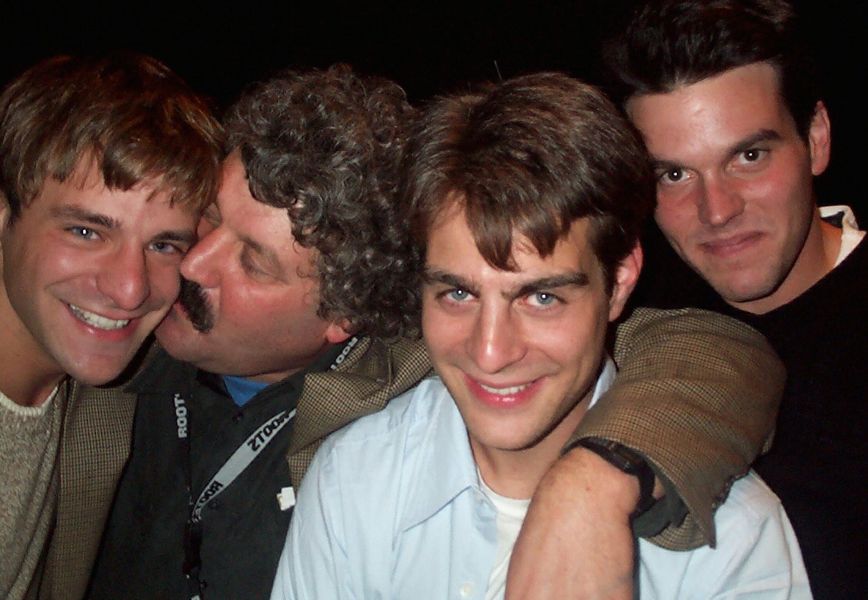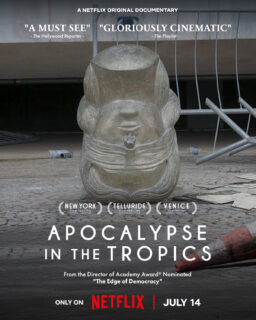TORONTO — The Dude is standing in the middle of the press office at the Toronto Film Festival. I have been out of my hotel room for four minutes and he has found me.
“This one you gotta see,” he tells me.
He hands me two Xeroxed sheets stapled together. They advertise a movie, “Goat on Fire & Smiling Fish.” With a certainty that borders on helpless acceptance, I know that although 317 movies are playing at the festival and I will not see at least 280 of them, I will be seeing “Goat on Fire & Smiling Fish.”
“What’s it about?” I ask.
“This is Kevin Jordan,” the Dude says, indicating a tall, dark-haired, intense young man. “He directed it.”
I shake hands with Jordan. We are strangers and yet our fates are entwined. It’s as if we are both passengers in the Dude’s small aircraft.
“Here,” says the Dude, turning back the first of the two sheets, so that I can see he has reproduced a page from the festival catalog, describing the film. “This is so good, we had to pay Michelle Maheux $10 to write it.”
I know Michelle Maheux and know that although she has doubtless been offered inducements far in excess of $10 over the years, she has never compromised her ferocious vision as a Toronto Film Festival programmer. I know the Dude and know that his idealism is so profound that he probably thinks $10 is a plausible size for a bribe – even in Canadian dollars, which works out to about $6.80 American.
The Dude’s name is Jeff Dowd. He is tall and large and has a lot of unruly curly hair and a big mustache. If you saw the Coen Brothers movie “The Big Lebowski,” Jeff Bridges was playing a character based on him, although the Dude is a great deal more abstentious than the Bridges character. If he were not, the movie would have been called “The Late Lebowski.” The Coens and Dowd go back a long way, to 1984, when he was telling me, “You gotta see this one. It’s called `Blood Simple.’ These are the Coen Brothers.”
Dowd wears so many hats it is difficult to assign him a title. Today he is playing the role of Rep. Whether Distributor’s Rep, Producer’s Rep, Director’s Rep or another species of Rep is impossible to say. He is Repping the film, that is for sure.
“Marty Scorsese liked this so much he decided to present it,” Dowd is saying. I peer at the top Xerox sheet again. Sure enough, it says “MARTIN SCORSESE” in big black letters, and beneath them, in a smaller typeface, “cordially invites you to the premiere screening.”
Did Scorsese produce the movie? No. Is he distributing it? No. Does he have a piece of it? No. Does he hope to work with Kevin Jordan in the future? No, Scorsese directs his own films. The long and the short of it is, Martin Scorsese cordially invited me to attend the premiere screening. Why does Scorsese extend this invitation? My instinct is that there is one degree of separation between Jordan, Scorsese and the Dude.
But no, I would be wrong. Scorsese found Jordan on his own.
“He saw one of my short films,” Jordan tells me. “He took me out to lunch and started a Martin Scorsese scholarship that paid for my senior year at NYU. Then I was an assistant to him on `Kundun.’ My family owns a lobster house in Brooklyn. He loves lobster. When I finished my film, I sent it to him, and he gave me some suggestions.”
How did you find “Goat on Fire & Smiling Fish”? I ask the Dude.
“I didn’t,” he answers. “It found me. I’ve only been Repping this film for about 15 days.”
“I saw him on a panel at the L.A. Independent Filmmakers Festival,” Jordan says. “He seemed like the coolest dude on the panel.”
The Dude beams.
“We were planning on coming up here and just wild-posting the movie,” Jordan says. That means sticking posters up all over town. “Jeff said he would help us. We haven’t even signed a contract yet.”
People like the Dude are one of the ways good movies find audiences in a world where bad movies are promoted with $40 million advertising budgets. He doesn’t have that kind of money, but he’s good at getting out the word. He has Repped titles like “The Black Stallion,” “Chariots of Fire,” “Hoosiers,” “The Stunt Man” and, of course, “The Blair Witch Project.”
“How I got started,” he says, “I was a political activist in the 1960s. Civil rights, Vietnam. I saw a movie named ‘Hearts and Minds‘ about the war. I had a friend in Seattle named Randy Finley, who had a little 100-seat theater named the Movie House. We were both so moved by this film. He wanted to show it. But the studio gave it to the only hardtop of this drive-in company.
“I asked Randy, `Would you be willing to take out a little two-inch ad telling people to go see this movie in your competitor’s theater?’ He did. Then I got front-page play on the story.”
The Dude beams.
“The movie wound up running 17 weeks and setting a house record!”
But in your competitor’s theater, I point out.
He shrugs.
“Just so people see them,” he says. “I’d walk up and down the lines for hit movies, handing out brochures for what we were showing. The way I figure it is, who goes to movies? People who go to movies, that’s who. They may or may not read Premiere magazine. They may or may not watch TV. But they go to movies. So if Warner Bros. spends $40 million to promote a movie and they’re standing in line to see it, why not tell them about my movie?”
The Dude tells me “Goat on Fire & Smiling Fish” would be playing next Thursday, Friday and Saturday. I tell him I will be sure to see it.
“A lot of the movies I Rep,” he says, “they’re not what they seem to be. You take `The Black Stallion.’ The studio said it would never appeal to children because the first 18 minutes were without dialogue. I hold a test screening. A little girl, 5 years old, is in front of me. She tells her mommy she has to pee. She gets up and stands on the aisle, still watching the screen, and she stands there for the next 10 minutes. Her knees are knocking together, she has to pee so bad, but she can’t stop watching.”
The Dude beams.
“The whole history of `The Black Stallion‘ was changed, right then and there.”












